posted by Phil Johnson

The PyroManiacs devote some space each weekend to highlights from The Spurgeon Archive. The following excerpt is from "The Sin of Unbelief," a sermon on 2 Kings 7:19. Spurgeon originally preached it on 14 January 1855 at New Park Street Chapel, Southwark.
 nbelief hath more phases than the moon, and more colors than the chameleon. Common people say of the devil, that he is seen sometimes in one shape, and sometimes in another. I am sure this is true of Satan's first-born child—unbelief, for its forms are legion.
nbelief hath more phases than the moon, and more colors than the chameleon. Common people say of the devil, that he is seen sometimes in one shape, and sometimes in another. I am sure this is true of Satan's first-born child—unbelief, for its forms are legion.At one time I see unbelief dressed out as an angel of light. It calls itself humility, and it saith, "I would not be presumptuous; I dare not think that God would pardon me; I am too great a sinner." We call that humility, and thank God that our friend is in so good a condition. I do not thank God for any such delusion. It is the devil dressed as an angel of light; it is unbelief after all.
At other times we detect unbelief in the shape of a doubt of God's immutability: "The Lord has loved me, but perhaps he will cast me off to-morrow. He helped me yesterday, and under the shadows of his wings I trust; but perhaps I shall receive no help in the next affliction. He may have cast me off; he may be unmindful of his covenant, and forget to be gracious." Sometimes this infidelity is embodied in a doubt of God's power. We see every day new straits, we are involved in a net of difficulties, and we think "surely the Lord cannot deliver us." We strive to get rid of our burden, and finding that we cannot do it, we think God's arm is as short as ours, and his power as little as human might.
A fearful form of unbelief is that doubt which keeps men from coming to Christ; which leads the sinner to distrust the ability of Christ to save him, to doubt the willingness of Jesus to accept so great a transgressor. But the most hideous of all is the traitor, in its true colors, blaspheming God, and madly denying his existence.
Infidelity, deism, and atheism are the ripe fruits of this pernicious tree; they are the most terrific eruptions of the volcano of unbelief. Unbelief hath become of full stature when quitting the mask and laying aside disguise, it profanely stalks the earth, uttering the rebellious cry, "No God," striving in vain to shake the throne of the divinity, by lifting up its arm against Jehovah, and in its arrogance would
Re-judge his justice—be the god of God."
Then truly unbelief has come to its full perfection, and then you see what it really is, for the least unbelief is of the same nature as the greatest.
I am astonished, and I am sure you will be, when I tell you that there are some strange people in the world who do not believe that unbelief is a sin. Strange people I must call them, because they are sound in their faith in every other respect; only, to make the articles of their creed consistent, as they imagine, they deny that unbelief is sinful.
I remember a young man going into a circle of friends and ministers, who were disputing whether it was a sin in men that they did not believe the gospel. Whilst they were discussing it, he said, "Gentlemen am I in the presence of Christians? Are you believers in the Bible, or are you not?"
They said, "We are Christians of course."
"Then," said he, "does not the Scripture say, 'of sin, because they believed not on me?' And is it not the damning sin of sinners, that they do not believe on Christ?"
I could not have thought that persons should be so fool-hardy as to venture to assert that "it is no sin for a sinner not to believe on Christ." I thought that, however far they might wish to push their sentiments, they would not tell a lie to uphold the truth, and, in my opinion this is what such men are really doing.
Truth is a strong tower and never requires to be buttressed with error. God's Word will stand against all man's devices. I would never invent a sophism to prove that it is no sin on the part of the ungodly not to believe, for I am sure it is, when I am taught in the Scriptures that, "This is the condemnation, that light is come into the world, and men love darkness rather than light," and when I read, "He that believeth not is condemned already, because he believeth not on the Son of God," I affirm, and the Word declares it, unbelief is a sin.
Surely with rational and unprejudiced persons, it cannot require any reasoning to prove it. Is it not a sin for a creature to doubt the word of its Maker? Is it not a crime and an insult to the Divinity, for me, an atom, a particle of dust, to dare to deny his words? Is it not the very summit of arrogance and extremity of pride for a son of Adam to say, even in his heart, "God I doubt thy grace; God I doubt thy love; God I doubt thy power?"
Oh! sirs believe me, could ye roll all sins into one mass,—could you take murder, and blasphemy, and lust, adultery, and fornication, and everything that is vile and unite them all into one vast globe of black corruption, they would not equal even then the sin of unbelief. This is the monarch sin, the quintessence of guilt; the mixture of the venom of all crimes; the dregs of the wine of Gomorrah; it is the A1 sin, the masterpiece of Satan, the chief work of the devil.


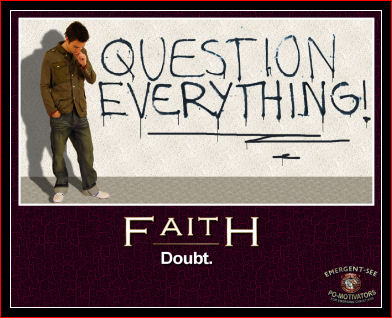
 disciples' to Christ. It is as if He were saying,
disciples' to Christ. It is as if He were saying,
 by Frank Turk
by Frank Turk The evangelical mistake is this: if we make a community with attractive values, maybe we can then slip the Gospel in sideways and draw people to Christ. It makes the community consequences of the Gospel the objective rather than something which is caused by the objective.
The evangelical mistake is this: if we make a community with attractive values, maybe we can then slip the Gospel in sideways and draw people to Christ. It makes the community consequences of the Gospel the objective rather than something which is caused by the objective.
 hat can be taken two ways. It might mean that although preaching seems a foolish strategy, that is the strategy God chose anyway.
hat can be taken two ways. It might mean that although preaching seems a foolish strategy, that is the strategy God chose anyway. Idiomatically and contextually, however, it makes more sense to interpret that verse way it has been translated in most of the modern versions: "It pleased God through the folly of what we preach to save those who believe" (ESV, emphasis added).
Idiomatically and contextually, however, it makes more sense to interpret that verse way it has been translated in most of the modern versions: "It pleased God through the folly of what we preach to save those who believe" (ESV, emphasis added).

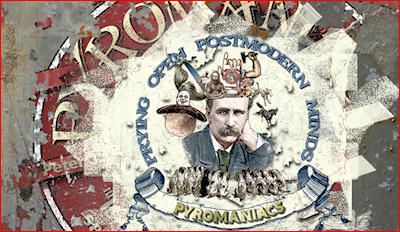
 he word evangelical used to be a good one. The term dates back at least to William Tyndale, and it refers to the belief that the gospel message—the evangel—is the vital heart of all Christian truth. To a real evangelical, everything that is of primary importance in Christianity is embodied and summarized in the gospel, and any belief system based on an aberrant gospel is not authentically Christian.
he word evangelical used to be a good one. The term dates back at least to William Tyndale, and it refers to the belief that the gospel message—the evangel—is the vital heart of all Christian truth. To a real evangelical, everything that is of primary importance in Christianity is embodied and summarized in the gospel, and any belief system based on an aberrant gospel is not authentically Christian.

 There's no denying that the evangelical movement has utterly lost its way. If that fact weren't already sufficiently clear, the point has now been punctuated emphatically—twice in the past year—with the resignations of top leaders from the movement's two most important umbrella organizations.
There's no denying that the evangelical movement has utterly lost its way. If that fact weren't already sufficiently clear, the point has now been punctuated emphatically—twice in the past year—with the resignations of top leaders from the movement's two most important umbrella organizations.

 s it come to this, that if we use our freedom to speak our mind we must needs be charged with arrogance?
s it come to this, that if we use our freedom to speak our mind we must needs be charged with arrogance?

 omething that drives me crazy about the Emerging Conversation is the way endless disclaimers and qualifications are supposed to be piled onto every profession of belief. Even the most "conservative" Emerging types do this almost pathologically:
omething that drives me crazy about the Emerging Conversation is the way endless disclaimers and qualifications are supposed to be piled onto every profession of belief. Even the most "conservative" Emerging types do this almost pathologically: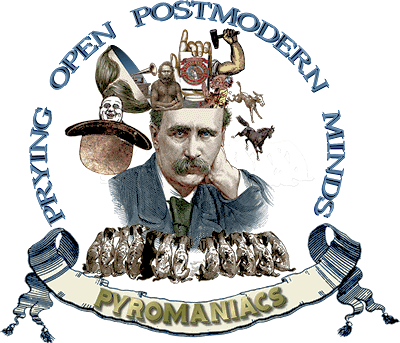
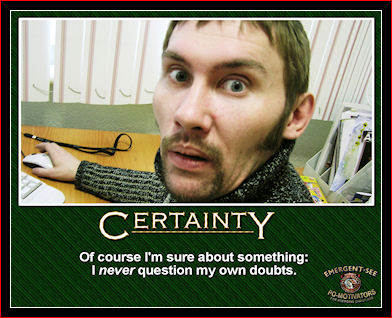

 And now, when we think of Judas, we think of this, we think of what came of this. Not of the preaching, the following, the miracle-ministry. No, Judas' name is the eponym of a traitor. We remember his treachery, and we remember his foul kiss.
And now, when we think of Judas, we think of this, we think of what came of this. Not of the preaching, the following, the miracle-ministry. No, Judas' name is the eponym of a traitor. We remember his treachery, and we remember his foul kiss. him?
him?
 Yeah, this is the "kingdom Now" stuff which needs its own special kind of beating. If this means we ought to be "good stewards" of the stuff we have, who can argue? If this means somehow changing Microsoft and the United Nations into organs of the Gospel somehow ... it seems to me this is both an unreasonable expectation and a violation of being in the world but not of the world.
Yeah, this is the "kingdom Now" stuff which needs its own special kind of beating. If this means we ought to be "good stewards" of the stuff we have, who can argue? If this means somehow changing Microsoft and the United Nations into organs of the Gospel somehow ... it seems to me this is both an unreasonable expectation and a violation of being in the world but not of the world.
 tenure, or their membership, or their association. No; in fact,
tenure, or their membership, or their association. No; in fact,  many paths different people take "to God."
many paths different people take "to God." 
![[A] Boneless [B] rubber [C] chicken. Any questions?](http://www.spurgeon.org/images/pyromaniac/TeamPyro/rchikn.jpg) law" (v. 53), or "I look at the faithless with disgust, because they do not keep your commands" (v. 158)? It appears that these elite and refined souls are strangers to such passions.
law" (v. 53), or "I look at the faithless with disgust, because they do not keep your commands" (v. 158)? It appears that these elite and refined souls are strangers to such passions.

 So I hunted up
So I hunted up  All that aside, the editorial was essentially correct. The foundation was laid years ago for the current rift in the Anglican movement. In fact, the real roots of the problem go back to
All that aside, the editorial was essentially correct. The foundation was laid years ago for the current rift in the Anglican movement. In fact, the real roots of the problem go back to 
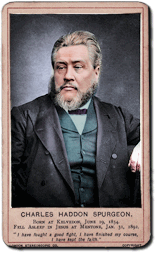
 he blind man has not come into the world of light and color, and the unregenerate man has not come into that world of spirit, and hence neither of them is capable of judging correctly.
he blind man has not come into the world of light and color, and the unregenerate man has not come into that world of spirit, and hence neither of them is capable of judging correctly. He was also as proficient in the quantity as in the quality, and disposed of meats and drinks in a most wholesale manner. His retreating forehead, empurpled nose, and protruding lips, made him—while eating, at least—more like an animal than a man.
He was also as proficient in the quantity as in the quality, and disposed of meats and drinks in a most wholesale manner. His retreating forehead, empurpled nose, and protruding lips, made him—while eating, at least—more like an animal than a man.








